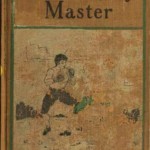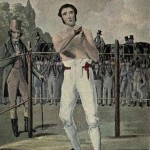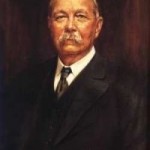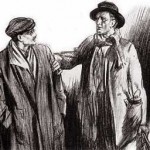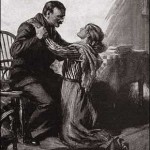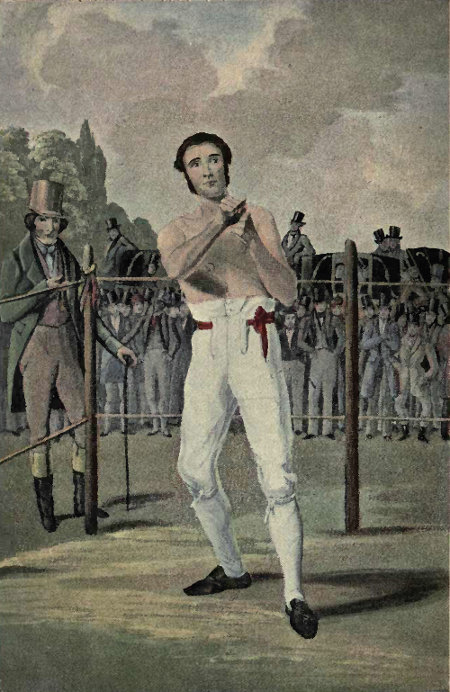
WORK was struck at one o’clock at the coal-pits and the iron-works, and the fight was arranged for three. From the Croxley Furnaces, from Wilson’s Coal-pits, from the Heartsease Mine, from the Dodd Mills, from the Leverworth Smelters the workmen came trooping, each with his fox-terrier or his lurcher at his heels. Warped with labour and twisted by toil, bent double by week-long work in the cramped coal galleries, or half-blinded with years spent in front of white-hot fluid metal, these men still gilded their harsh and hopeless lives by their devotion to sport. It was their one relief, the only thing which could distract their mind from sordid surroundings, and give them an interest beyond the blackened circle which inclosed them. Literature, art, science, all these things were beyond the horizon; but the race, the football match, the cricket, the fight, these were things which they could understand, which they could speculate upon in advance and comment upon afterwards. Sometimes brutal, sometimes grotesque, the love of sport is still one of the great agencies which make for the happiness of our people. It lies very deeply in the springs of our nature, and when it has been educated out, a higher, more refined nature may be left, but it will not be of that robust British type which has left its mark so deeply on the world. Every one of these ruddled workers, slouching with his dog at his heels to see something of the fight, was a true unit of his race.
It was a squally May day, with bright sun-bursts and driving showers. Montgomery worked all morning in the surgery getting his medicine made up.
“The weather seems so very unsettled, Mr. Montgomery,” remarked the doctor, “that I am inclined to think that you had better postpone your little country excursion until a later date.”
“I am afraid that I must go to-day, sir.”
“I have just had an intimation that Mrs. Potter, at the other side of Angleton, wishes to see me. It is probable that I shall be there all day. It will be extremely inconvenient to leave the house empty so long.”
“I am very sorry, sir, but I must go,” said the assistant, doggedly.
The doctor saw that it would be useless to argue, and departed in the worst of bad tempers upon his mission. Montgomery felt easier now that he was gone. He went up to his room, and packed his running-shoes, his fighting-drawers, and his cricket-sash into a handbag. When he came down Mr. Wilson was waiting for him in the surgery.
“I hear the doctor has gone.”
“Yes; he is likely to be away all day.”
“I don’t see that it matters much. It’s bound to come to his ears by to-night.”
“Yes; it’s serious with me, Mr. Wilson. If I win, it’s all right. I don’t mind telling you that the hundred pounds will make all the difference to me. But if I lose, I shall lose my situation, for, as you say, I can’t keep it secret.”
“Never mind. We’ll see you through among us. I only wonder the doctor has not heard, for it’s all over the country that you are to fight the Croxley Champion. We’ve had Armitage up about it already. He’s the Master’s backer, you know. He wasn’t sure that you were eligible. The Master said he wanted you whether you were eligible or not. Armitage has money on, and would have made trouble if he could. But I showed him that you came within the conditions of the challenge, and he agreed that it was all right. They think they have a soft thing on.”
“Well, I can only do my best,” said Montgomery.
They lunched together; a silent and rather nervous repast, for Montgomery’s mind was full of what was before him, and Wilson had himself more money at stake than he cared to lose.
Wilson’s carriage and pair were at the door, the horses with blue-and-white rosettes at their ears, which were the colours of the Wilson Coal-pits, well known on many a football field. At the avenue gate a crowd of some hundred pit-men and their wives gave a cheer as the carriage passed. To the assistant it all seemed dream-like and extraordinary—the strangest experience of his life, but with a thrill of human action and interest in it which made it passionately absorbing. He lay back in the open carriage and saw the fluttering handkerchiefs from the doors and windows of the miners’ cottages. Wilson had pinned a blue-and-white rosette upon his coat, and every one knew him as their champion. “Good luck, sir! good luck to thee!” they shouted from the roadside. He felt that it was like some unromantic knight riding down to sordid lists, but there was something of chivalry in it all the same. He fought for others as well as for himself. He might fail from want of skill or strength, but deep in his sombre soul he vowed that it should never be for want of heart.
Mr. Fawcett was just mounting into his high-wheeled, spidery dogcart, with his little bit of blood between the shafts. He waved his whip and fell in behind the carriage. They overtook Purvis, the tomato-faced publican, upon the road, with his wife in her Sunday bonnet. They also dropped into the procession, and then, as they traversed the seven miles of the high-road to Croxley, their two-horsed, rosetted carriage became gradually the nucleus of a comet with a loosely radiating tail. From every side-road came the miners’ carts, the humble, ramshackle traps, black and bulging, with their loads of noisy, foul-tongued, open-hearted partisans. They trailed for a long quarter of a mile behind them—cracking, whipping, shouting, galloping, swearing. Horsemen and runners were mixed with the vehicles. And then suddenly a squad of the Sheffield Yeomanry, who were having their annual training in those parts, clattered and jingled out of a field, and rode as an escort to the carriage. Through the dust-clouds round him Montgomery saw the gleaming brass helmets, the bright coats, and the tossing heads of the chargers, the delighted brown faces of the troopers. It was more dream-like than ever.

